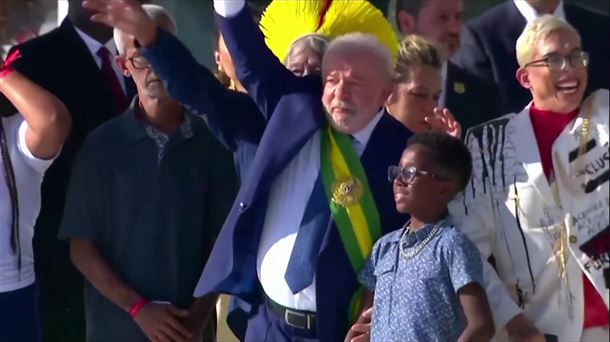The leader of the Workers’ Party assumes his third term, 20 years after his last presidency. Both Lula and the country have changed in two decades, although challenges such as the fight against poverty or insecurity have not. In addition, the leftist will have to face the legacy of Bolsonaro.
1:14


Euskaraz irakurri: Lula da Silvaren erronka nagusiak
“Rebuild a country in ruins”, that’s what the new president of Brazil promised yesterday during his inauguration speech, Luiz Inacio Lula da Silva, of what will be his third term, 20 years after his last presidency (he led the country in 2003 and 2010). Both the leader of the Workers’ Party (PT) and Brazil have changed in these two decades, although the fight against poverty and insecurity continue to be pending tasks. To this he will add the need to reverse certain conflicts inherited from his predecessor, the far-right, Jair Bolsonaro. We summarize the main challenges of the leftist leader:
Environment. Lula has promised to end illegal deforestation in the Amazon. In fact, in one of his first decisions, he has determined the reactivation of the so-called Amazon Fund, endowed with international funds to contribute to the protection of the Amazon and which had been suspended by Bolsonaro’s decision in 2019. Lula has also suspended the expansion of licenses for the exploitation of mineral resources in the Amazon region and even on indigenous lands. “Brazil does not need to deforest to increase its agricultural frontier,” he has insisted on numerous occasions.
indigenous collective. In relation to the above, Lula has promised that he will resume the demarcation of indigenous lands, paralyzed during Bolsonaro’s four-year term. “Each demarcated land is a new environmental area (…) We are going to revoke all the injustices against the indigenous peoples”, he has sentenced in his inauguration. Proof of the importance that Lula’s government gives to this group and their interests, one of the 37 ministries that the Executive will have will be that of Indigenous Peoples, which will be led by the activist and deputy Sônia Guajajara, one of the most recognized indigenous leaders in the at international level.
Economy. The fight against hunger and poverty is another of Lula’s priorities. 33 million people are hungry in Brazil and some 100 million people, almost half of the country’s population, are poor. According to the NGO Oxfam, the country has gone back to the 1990s.
Unlike the golden years of the first PT government, when the Brazilian economy grew at an average of 4% per year and progress was made in reducing poverty, the economic panorama that Lula now reflects is very different, with volatile inflation. —from 6% in November— and a slowdown in growth that has yet to be determined (the Central Bank estimated that GDP would grow by 2.9% in 2022 and that, in 2023, it would remain at around 1%). The unemployment rate stands at 8.7% of the active population, the lowest level since 2015, but economists fear that the slowdown in the economy could affect the labor market.
political fragmentation. Lula is obliged to attend to a politically divided citizenry, after his victory that was not as bulky as might be expected. Unlike the executives formed in his previous presidencies, formed almost exclusively by left-wing parties, this time he has formed a multi-party government, with a tendency towards the center. Congress will also be dominated by conservative parties, thanks to the rise of the ultra-right, which will limit the new president’s room for manoeuvre.
Latin America and international politics. Lula has already begun to make it clear that, in the international arena, he will also distance himself from his predecessor, an ally of former President Donald Trump and a critic of multilateralism. Bolsonaro was practically alone worldwide during the covid-19 pandemic, criticizing the restrictions and spreading health hoaxes. Lula wants to reverse this situation of “international pariah.”
The Brazilian president is also committed to “resuming integration” in Latin America, governed mainly by left-wing parties. “We will resume integration based on Mercosur, with the revitalization of the Union of South American Nations (Unasur) and other sovereign bodies” that exist in Latin America, he declared before Parliament after being sworn in as the new Brazilian president.
Corruption. The great ballast that continues to affect Lula’s image and that aroused internal hatred in part of Brazilian society are the cases of corruption that stained his administration and that of Rousseff. Investigations into corruption around the Petrobras oil company and the Odebrecht construction company led Lula to jail in 2018, where he served 580 days in prison, before the Supreme Court annulled the convictions.
Source: Eitb
Kingston is an accomplished author and journalist, known for his in-depth and engaging writing on sports. He currently works as a writer at 247 News Agency, where he has established himself as a respected voice in the sports industry.












